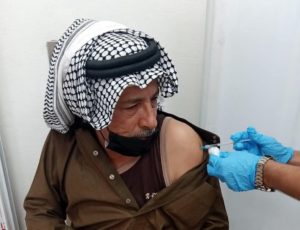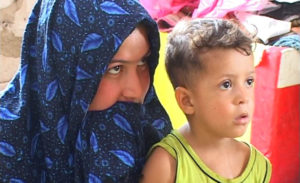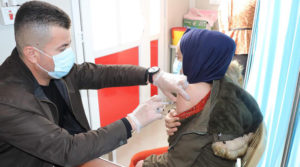Whether fuelled by political and religious leaders, or the media, hate speech in Iraq taps into deeper problems of structural inequality in society and has been greatly exacerbated by conflict and Covid-19 in recent months, as uncovered by researchers from Independent Media Organization in Kurdistan (IMOK), part of the IDS-led Consortium for Religious Equality and Inclusive Development (CREID) programme. Engaging leaders, training journalists and equipping civil society activists with media literacy may be one way to tackle it.

Photo by Ravi Sharma on Unsplash.
The spread of hate speech is a prominent issue in Iraq with extremely dangerous effects, particularly given the fragile security, political and social environment of the country. Day after day, there is a significant production of divisive and polarising content targeting certain groups, especially minorities, increasing their vulnerability and provoking hatred and discrimination, risking further social and political conflict.
Although the everyday use of technology is now the norm for many people, it’s become a double-edged sword, especially on social media networks where people express their biases, discriminatory sentiments, and promote and fuel division and hatred against one another. On the other hand, the same technology and social media platforms can also be used effectively to counter and deconstruct the widespread use of hate speech or “fake news”.
The Independent Media Organization in Kurdistan (IMOK), part of the IDS-led Consortium for Religious Equality and Inclusive Development (CREID), is working on hate speech in Iraq to increase our understanding of how hate speech is initiated and spread, and its impact through:
- Social media monitoring and analysis
- Conducting nationwide hate speech surveys
- Consulting faith and minority community leaders
- Training media personnel on responsible reporting and civil society activists on media literacy and minority rights awareness.
“Hate speech creates an us-against-them attitude which is very difficult to get rid of.” Baha’i Participant in IMOK consultation
Through our online surveys, we found that 97% of participants knew someone who had been a victim of hate speech. Most respondents believed that ongoing political, financial, economic, and sectarian problems in Iraq have resulted in an increase of online hate.
Four underlying causes contributing to prevalence of hate speech in Iraq
While many underlying causes can lead to hate speech occurring, such as pressures and tensions stemming from political changes, economic or humanitarian crisis, civil unrest and conflict, or through more overt practices, for instance tactical political campaigns aimed at polarising communities and solidifying support, we’ve found that there are also more nuanced elements that contribute to the marginalisation and violent targeting of religious groups. Those from minorities who took part in our consultation sessions felt that there are social, legal and cultural factors that contribute to creating a social class system in which some religious groups rank higher than others and are thereby afforded greater protection and respect.
- The presence of religious discourse directed against particular social groups, including ethnic and religious minorities, but also against majority or larger sects. This discourse can stem from religious institutions, religious leaders, or even from religious education in schools.
- The media plays its part in creating a social hierarchy, and/or distinguishing between social/religious components. This sentiment can derive from harmful or irresponsible media practices, such as imbalanced reporting, resulting in an underrepresentation of religious minorities in the media; negative or biased portrayal of people from particular faiths or sects; and failure to consult or interview affected religious groups, leading to the spread of misinformation or a biased portrayal of events/incidents.
- The Iraqi legal and political system, which in many instances does not favour or provide equal rights to religious minorities. One example is the political quota system, which fails to represent all faiths.
- The cultural and religious value attributed both socially (through celebrations) and officially (through public holidays) to majority population faiths has created a perception of the social inferiority of minority religions and their adherents. These are all believed to create an environment that more easily permits or accepts hate speech against minorities.
During our consultation sessions, we found a general agreement that those in positions of power, such as religious leaders and political actors, are key instigators of hate in Iraq, with some arguing that discrimination and violence derives from them spreading and promoting hate speech amongst Iraqi society. Others believed that discriminatory attitudes and harmful biases already exist in the Iraqi social fabric but lay dormant until stimulated by certain political and religious leaders.
Since the emergence of the Covid-19 pandemic, several measures taken by the state have been unfavourable towards civil society, such as a temporary freeze on public sector salaries, as well as country-wide job losses. This has occurred in a climate of pre-existing social and political tensions between the Kurdistan Regional Government and the central government of Iraq; civil and political unrest; regional conflicts between Iraq, Turkey and Syria; proxy conflicts between Iran and the United States; general insecurity; and lack of public services, including healthcare. As a result of these conditions, we have seen a rise in the inclination of young people to use hate speech, particularly in the contexts of political discourse.
‘Hate speech is the weakening of one group at the expense of another.’ Shi’a Faili Kurd Participant in IMOK consultation
Through our monitoring of hate speech work, we’ve seen a clear link between what is occurring offline and what is being said online, implying that political, economic, security and even health factors can pose a threat to social cohesion and escalate hate speech to violence. We have seen a significant peak in online activity when the country has been in lockdown, and this was accompanied by a rise in misinformation pertaining to the pandemic.
To address this, we believe that young people need to be targeted to counter hate speech, whilst also recognising that the need to train lawmakers, MPs and legislators on the topic of hate speech and the boundaries between freedom of speech and expression and hate. In fact, more needs to be done to raise awareness overall, including holding social media platforms to account, supporting those who become victims of hate speech, and boosting positive counter messages to reinforce tolerance.



